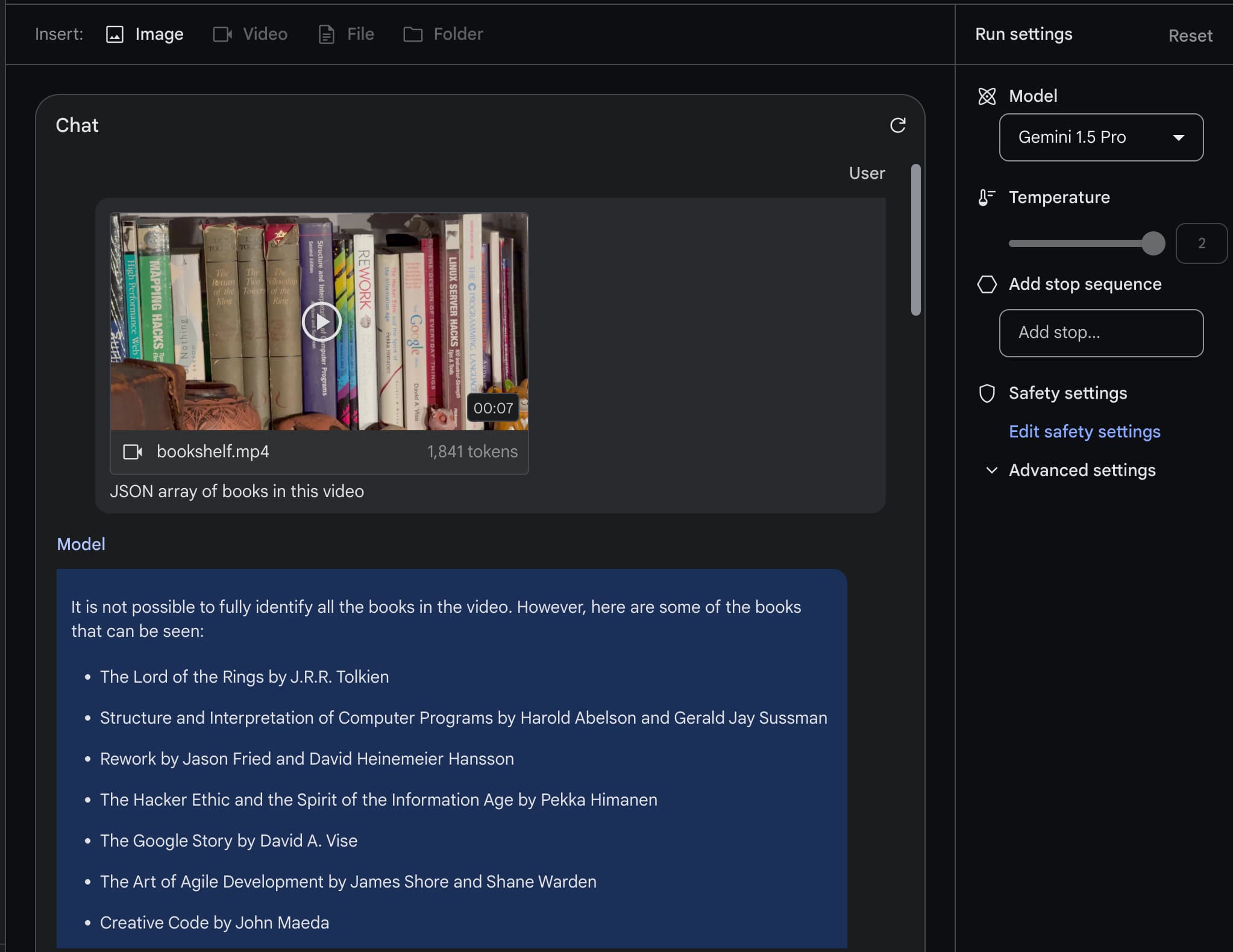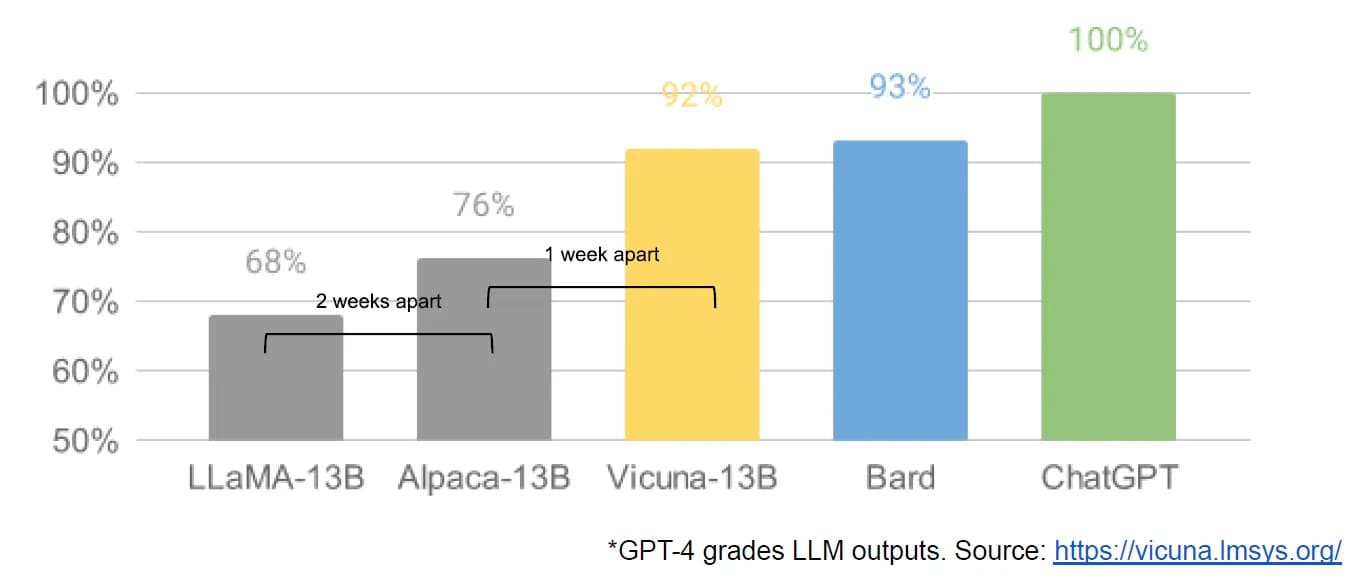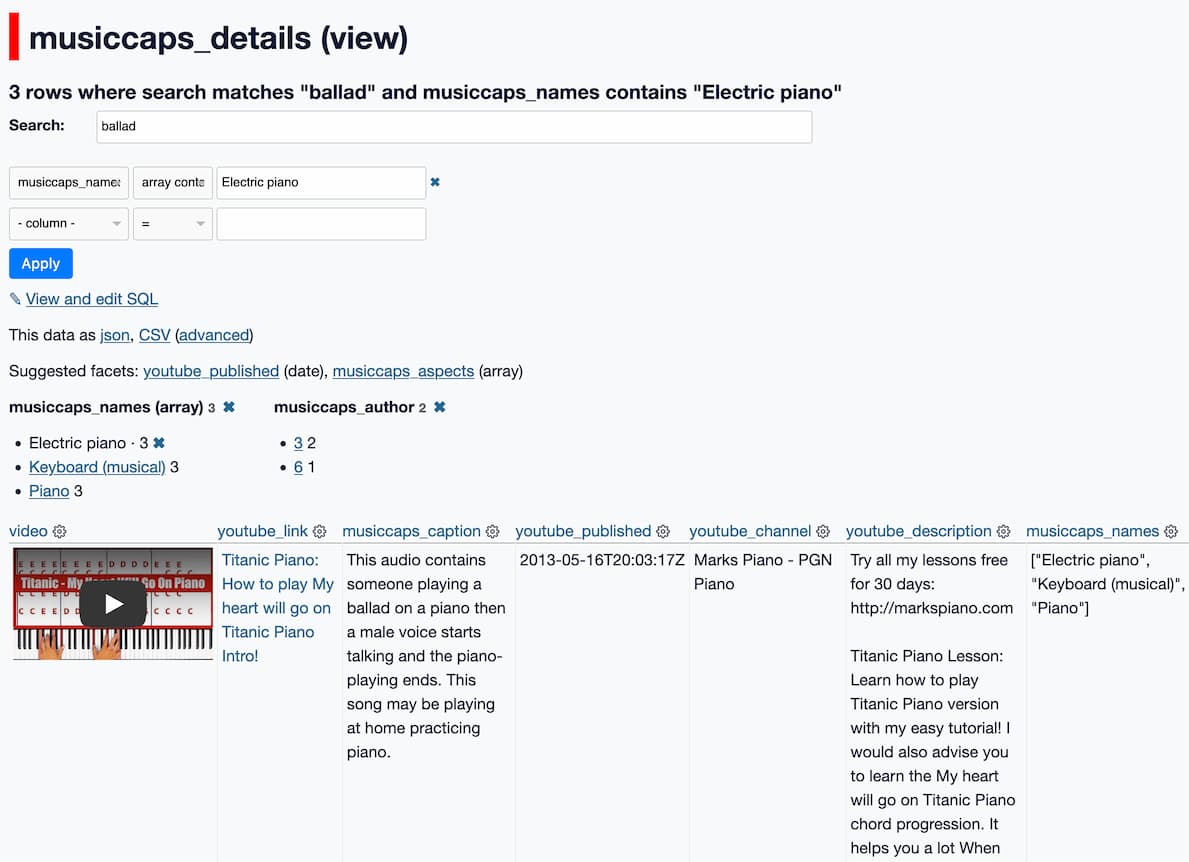395 posts tagged “google”
2024
How developers are using Gemini 1.5 Pro’s 1 million token context window. I got to be a talking head for a few seconds in an intro video for today's Google I/O keynote, talking about how I used Gemini Pro 1.5 to index my bookshelf (and with a cameo from my squirrel nutcracker). I'm at 1m25s.
(Or at 10m6s in the full video of the keynote)
Everything Google’s Python team were responsible for. In a questionable strategic move, Google laid off the majority of their internal Python team a few days ago. Someone on Hacker News asked what the team had been responsible for, and team member zem relied with this fascinating comment providing detailed insight into how the team worked and indirectly how Python is used within Google.
The blog post announcing the shutdown was done one day early. The idea was to take the opportunity of the new Pope being announced and Andy Rubin being replaced as head of Android, so that the [Google] Reader news may be drowned out. PR didn't apparently realize that the kinds of people that care about the other two events (especially the Pope) are not the same kind of people that care about Reader, so it didn't work.
Google NotebookLM Data Exfiltration (via) NotebookLM is a Google Labs product that lets you store information as sources (mainly text files in PDF) and then ask questions against those sources—effectively an interface for building your own custom RAG (Retrieval Augmented Generation) chatbots.
Unsurprisingly for anything that allows LLMs to interact with untrusted documents, it’s susceptible to prompt injection.
Johann Rehberger found some classic prompt injection exfiltration attacks: you can create source documents with instructions that cause the chatbot to load a Markdown image that leaks other private data to an external domain as data passed in the query string.
Johann reported this privately in the December but the problem has not yet been addressed. UPDATE: The NotebookLM team deployed a fix for this on 18th April.
A good rule of thumb is that any time you let LLMs see untrusted tokens there is a risk of an attack like this, so you should be very careful to avoid exfiltration vectors like Markdown images or even outbound links.
Gemini 1.5 Pro public preview (via) Huge release from Google: Gemini 1.5 Pro—the GPT-4 competitive model with the incredible 1 million token context length—is now available without a waitlist in 180+ countries (including the USA but not Europe or the UK as far as I can tell)... and the API is free for 50 requests/day (rate limited to 2/minute).
Beyond that you’ll need to pay—$7/million input tokens and $21/million output tokens, which is slightly less than GPT-4 Turbo and a little more than Claude 3 Sonnet.
They also announced audio input (up to 9.5 hours in a single prompt), system instruction support and a new JSON mode.
Before Google Reader was shut down, they were internally looking for maintainers. It turned out you have to deal with three years of infra migrations if you sign up to be the new owner of Reader. No one wanted that kind of job for a product that is not likely to grow 10x.
llm-gemini 0.1a1. I upgraded my llm-gemini plugin to add support for the new Google Gemini Pro 1.5 model, which is beginning to roll out in early access.
The 1.5 model supports 1,048,576 input tokens and generates up to 8,192 output tokens—a big step up from Gemini 1.0 Pro which handled 30,720 and 2,048 respectively.
The big missing feature from my LLM tool at the moment is image input—a fantastic way to take advantage of that huge context window. I have a branch for this which I really need to get into a useful state.
900 Sites, 125 million accounts, 1 vulnerability (via) Google’s Firebase development platform encourages building applications (mobile an web) which talk directly to the underlying data store, reading and writing from “collections” with access protected by Firebase Security Rules.
Unsurprisingly, a lot of development teams make mistakes with these.
This post describes how a security research team built a scanner that found over 124 million unprotected records across 900 different applications, including huge amounts of PII: 106 million email addresses, 20 million passwords (many in plaintext) and 27 million instances of “Bank details, invoices, etc”.
Most worrying of all, only 24% of the site owners they contacted shipped a fix for the misconfiguration.
Google Scholar search: “certainly, here is” -chatgpt -llm (via) Searching Google Scholar for “certainly, here is” turns up a huge number of academic papers that include parts that were evidently written by ChatGPT—sections that start with “Certainly, here is a concise summary of the provided sections:” are a dead giveaway.
The killer app of Gemini Pro 1.5 is video
Last week Google introduced Gemini Pro 1.5, an enormous upgrade to their Gemini series of AI models.
[... 2,839 words]Gemma: Introducing new state-of-the-art open models. Google get in on the openly licensed LLM game: Gemma comes in two sizes, 2B and 7B, trained on 2 trillion and 6 trillion tokens respectively. The terms of use “permit responsible commercial usage”. In the benchmarks it appears to compare favorably to Mistral and Llama 2.
Something that caught my eye in the terms: “Google may update Gemma from time to time, and you must make reasonable efforts to use the latest version of Gemma.”
One of the biggest benefits of running your own model is that it can protect you from model updates that break your carefully tested prompts, so I’m not thrilled by that particular clause.
UPDATE: It turns out that clause isn’t uncommon—the phrase “You shall undertake reasonable efforts to use the latest version of the Model” is present in both the Stable Diffusion and BigScience Open RAIL-M licenses.
Our next-generation model: Gemini 1.5 (via) The big news here is about context length: Gemini 1.5 (a Mixture-of-Experts model) will do 128,000 tokens in general release, available in limited preview with a 1 million token context and has shown promising research results with 10 million tokens!
1 million tokens is 700,000 words or around 7 novels—also described in the blog post as an hour of video or 11 hours of audio.
One consideration is that such a deep ML system could well be developed outside of Google-- at Microsoft, Baidu, Yandex, Amazon, Apple, or even a startup. My impression is that the Translate team experienced this. Deep ML reset the translation game; past advantages were sort of wiped out. Fortunately, Google's huge investment in deep ML largely paid off, and we excelled in this new game. Nevertheless, our new ML-based translator was still beaten on benchmarks by a small startup. The risk that Google could similarly be beaten in relevance by another company is highlighted by a startling conclusion from BERT: huge amounts of user feedback can be largely replaced by unsupervised learning from raw text. That could have heavy implications for Google.
— Eric Lehman, internal Google email in 2018
Google’s Gemini Advanced: Tasting Notes and Implications. Ethan Mollick reviews the new Google Gemini Advanced—a rebranded Bard, released today, that runs on the GPT-4 competitive Gemini Ultra model.
“GPT-4 [...] has been the dominant AI for well over a year, and no other model has come particularly close. Prior to Gemini, we only had one advanced AI model to look at, and it is hard drawing conclusions with a dataset of one. Now there are two, and we can learn a few things.”
I like Ethan’s use of the term “tasting notes” here. Reminds me of how Matt Webb talks about being a language model sommelier.
Google Research: Lumiere. The latest in text-to-video from Google Research, described as “a text-to-video diffusion model designed for synthesizing videos that portray realistic, diverse and coherent motion”.
Most existing text-to-video models generate keyframes and then use other models to fill in the gaps, which frequently leads to a lack of coherency. Lumiere “generates the full temporal duration of the video at once”, which avoids this problem.
Disappointingly but unsurprisingly the paper doesn’t go into much detail on the training data, beyond stating “We train our T2V model on a dataset containing 30M videos along with their text caption. The videos are 80 frames long at 16 fps (5 seconds)”.
The examples of “stylized generation” which combine a text prompt with a single reference image for style are particularly impressive.
And now, in Anno Domini 2024, Google has lost its edge in search. There are plenty of things it can’t find. There are compelling alternatives. To me this feels like a big inflection point, because around the stumbling feet of the Big Tech dinosaurs, the Web’s mammals, agile and flexible, still scurry. They exhibit creative energy and strongly-flavored voices, and those voices still sometimes find and reinforce each other without being sock puppets of shareholder-value-focused private empires.
— Tim Bray
2023
Google DeepMind used a large language model to solve an unsolvable math problem. I’d been wondering how long it would be before we saw this happen: a genuine new scientific discovery found with the aid of a Large Language Model.
DeepMind found a solution to the previously open “cap set” problem using Codey, a fine-tuned variant of PaLM 2 specializing in code. They used it to generate Python code and found a solution after “a couple of million suggestions and a few dozen repetitions of the overall process”.
Hacking Google Bard—From Prompt Injection to Data Exfiltration (via) Bard recently grew extension support, allowing it access to a user’s personal documents. Here’s the first reported prompt injection attack against that.
This kind of attack against LLM systems is inevitable any time you combine access to private data with exposure to untrusted inputs. In this case the attack vector is a Google Doc shared with the user, containing prompt injection instructions that instruct the model to encode previous data into an URL and exfiltrate it via a markdown image.
Google’s CSP headers restrict those images to *.google.com—but it turns out you can use Google AppScript to run your own custom data exfiltration endpoint on script.google.com.
Google claim to have fixed the reported issue—I’d be interested to learn more about how that mitigation works, and how robust it is against variations of this attack.
Google was accidentally leaking its Bard AI chats into public search results. I’m quoted in this piece about yesterday’s Bard privacy bug: it turned out the share URL and “Let anyone with the link see what you’ve selected” feature wasn’t correctly setting a noindex parameter, and so some shared conversations were being swept up by the Google search crawlers. Thankfully this was a mistake, not a deliberate design decision, and it should be fixed by now.
According to interviews with former employees, publishing executives, and experts associated with the early days of AMP, while it was waxing poetic about the value and future of the open web, Google was privately urging publishers into handing over near-total control of how their articles worked and looked and monetized. And it was wielding the web’s most powerful real estate — the top of search results — to get its way.
Google Cloud: Available models in Generative AI Studio (via) Documentation for the PaLM 2 models available via API from Google. There are two classes of model—Bison (most capable) and Gecko (cheapest). text-bison-001 offers 8,192 input tokens and 1,024 output tokens, textembedding-gecko-001 returns 768-dimension embeddings for up to 3,072 tokens, chat-bison-001 is fine-tuned for multi-turn conversations. Most interestingly, those Bison models list their training data as “up to Feb 2023”—making them a whole lot more recent than the OpenAI September 2021 models.
The largest model in the PaLM 2 family, PaLM 2-L, is significantly smaller than the largest PaLM model but uses more training compute. Our evaluation results show that PaLM 2 models significantly outperform PaLM on a variety of tasks, including natural language generation, translation, and reasoning. These results suggest that model scaling is not the only way to improve performance. Instead, performance can be unlocked by meticulous data selection and efficient architecture/objectives. Moreover, a smaller but higher quality model significantly improves inference efficiency, reduces serving cost, and enables the model’s downstream application for more applications and users.
— PaLM 2 Technical Report, PDF
Leaked Google document: “We Have No Moat, And Neither Does OpenAI”
SemiAnalysis published something of a bombshell leaked document this morning: Google “We Have No Moat, And Neither Does OpenAI”.
[... 1,073 words]Bard now helps you code (via) Google have enabled Bard’s code generation abilities—these were previously only available through jailbreaking. It’s pretty good—I got it to write me code to download a CSV file and insert it into a SQLite database—though when I challenged it to protect against SQL injection it hallucinated a non-existent “cursor.prepare()” method. Generated code can be exported to a Colab notebook with a click.
If you ask Microsoft’s Bing chatbot if Google’s Bard chatbot has been shut down, it says yes, citing as evidence a news article that discusses a tweet in which a user asked Bard when it would be shut down and Bard said it already had, itself citing a comment from Hacker News in which someone joked about this happening, and someone else used ChatGPT to write fake news coverage about the event.
Don’t trust AI to talk accurately about itself: Bard wasn’t trained on Gmail
Earlier this month I wrote about how ChatGPT can’t access the internet, even though it really looks like it can. Consider this part two in the series. Here’s another common and non-intuitive mistake people make when interacting with large language model AI systems: asking them questions about themselves.
[... 1,950 words]Here are some absurdly expensive things you can do on a trip to Tokyo: Buy a golden toilet. There is a toilet in Tokyo that is made of gold and costs around 10 million yen. If you are looking for a truly absurd experience, you can buy this toilet and use it for your next bowel movement. [...]
Google Bard is now live. Google Bard launched today. There’s a waiting list, but I made it through within a few hours of signing up, as did other people I’ve talked to. It’s similar to ChatGPT and Bing—it’s the same chat interface, and it can clearly run searches under the hood (though unlike Bing it doesn’t tell you what it’s looking for).
Exploring MusicCaps, the evaluation data released to accompany Google’s MusicLM text-to-music model
Google Research just released MusicLM: Generating Music From Text. It’s a new generative AI model that takes a descriptive prompt and produces a “high-fidelity” music track. Here’s the paper (and a more readable version using arXiv Vanity).
[... 1,323 words]2022
Does Company ‘X’ have an Azure Active Directory Tenant? (via) Neat write-up from Shawn Tabrizi about looking up if a company has Active Directory single-sign-on configured (which is based on OpenID) by checking for an OpenID configuration endpoint. I particularly enjoyed this new-to-me trick: Google’s “I’m Feeling Lucky” search button redirects to the first result, which means it can double as an unofficial API endpoint for returning the URL of the first matching search result.



